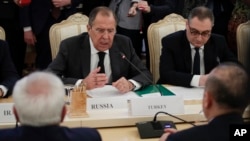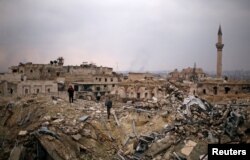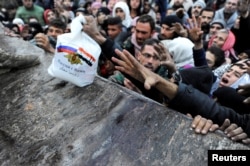The United States on Tuesday sought to downplay its absence from talks on the Syrian conflict among Russia, Iran and Turkey in Moscow, saying it was not a "snub" and did not reflect a decline of U.S. influence in the Middle East.
However, President Barack Obama's decision to offer only limited support to moderate rebels has left Washington with little leverage to influence the situation in Syria, especially after Moscow began launching airstrikes against rebels fighting President Bashar al-Assad.
Although Washington has long been a player in efforts to end the Syrian civil war and other Mideast conflicts, it was forced to watch from the sidelines as the Syrian government and its allies, including Russia, mounted an assault to pin down the rebels in east Aleppo that culminated in a cease-fire deal.
Dennis Ross, a fellow at the Washington Institute for Near East Policy who was an adviser on Iran and the Middle East to both Democratic and Republican administrations, said the United States had made itself "irrelevant" in Syria.
"The opposition finds little reason to be responsive to us and Assad. The Russians and Iran know that there is nothing we will do to raise the costs to them of their onslaught against Aleppo and other Syrian cities," Ross said. "Russia, having changed the balance of power on the ground, without regard to civilian consequences, has moved to make itself an arbiter."
Not a 'snub'
A spokesman for U.S. Secretary of State John Kerry dismissed suggestions that America's absence from the meeting indicated a change in influence.
"The secretary doesn't see this as a snub at all. He sees it as another multilateral effort to try to get a lasting peace in Syria, and he welcomes any progress towards that," State Department spokesman John Kirby said Tuesday.
"We would obviously refute any notion that ... the fact that we weren't at this one meeting is somehow a harbinger or a litmus test for U.S. influence and leadership there or anywhere else around the world," Kirby said, adding that Washington was still engaged in the region on many other issues.
"We are not excluded. We are not being sidelined," he added.
At the meeting Tuesday, Russia, Iran and Turkey said they were ready to help broker a Syrian peace deal, and they adopted a declaration that laid out the principles any agreement should follow.
Still, the meeting resulted in a "Moscow Declaration," reflecting Russia's growing links with Iran and Turkey, despite the slaying on Monday of Russia's ambassador in Ankara, Turkey's capital. The meeting also reflected Putin's desire to increase his country's influence in the Middle East and more widely.
A U.S. official acknowledged that the U.S. absence from the evacuation talks on eastern Aleppo was Russia's way of showing that Moscow, not Washington, was running the show.
"The fact is that we have put ourselves in a position where Russia is making efforts to try to work with anybody else so they can isolate us," the official, who spoke on condition of anonymity, told Reuters.
"We let our differences with Turkey over the Kurds and our views over the northern part of Syria create gaps that the Russians have exploited."
Focus on aid
Kirby said that in the end, the United States, Russia, Iran and Turkey would like to see an immediate cease-fire and the "urgent delivery" of humanitarian aid.
Ultimately, he said, it was too soon to judge whether the talks were a success.
Russian President Vladimir Putin said last week that he and his Turkish counterpart, Recep Tayyip Erdogan, were working to organize new Syrian peace negotiations without the United States or the United Nations.
Russia said that if they happened, the talks would be in addition to intermittent U.N.-brokered negotiations in Geneva.
Russian Foreign Minister Sergei Lavrov said Tuesday that he thought that what he called the Russia-Iran-Turkey troika was the most effective forum for trying to solve the Syria crisis.















